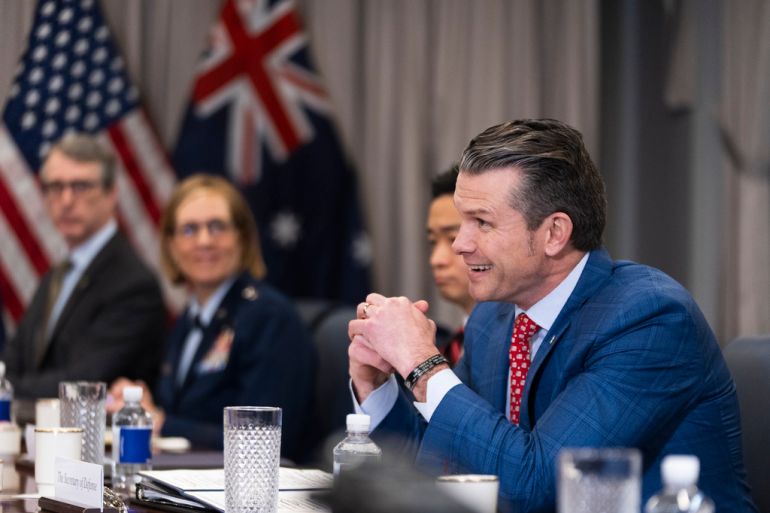US urges Australia to increase defence spending to 3.5% of GDP
PM Albanese says government already increasing spending and decisions will be based on defence capability needs.

By Al Jazeera StaffPublished On 2 Jun 20252 Jun 2025
United States Defense Secretary Peter Hegseth has called on Australia to increase its military spending to 3.5 percent of gross domestic product (GDP) “as soon as possible”.
Responding on Monday, Prime Minister Anthony Albanese said the government will decide on Australia’s defence capability needs before announcing spending.
Recommended Stories
list of 4 items
China warns US not to ‘play with fire’ over Taiwan
end of list
“What you should do in defence is decide what you need, your capability, and then provide for it,” Albanese told reporters.
“That’s what my government is doing. Investing to our capability and investing in our relationships.”
Albanese added that his government is already increasing defence spending by about 10 billion Australian dollars ($6.5bn).
“We’re continuing to lift up,” he said, citing his government’s goal to increase spending to 2.3 percent of GDP by 2033.
However, the government is facing other demands on its budget.
Albanese was speaking from a farm in the state of South Australia, which is experiencing a significant drought.
Meanwhile, Australia’s treasurer said the country is facing a bill of billions due to recent floods in New South Wales and Cyclone Alfred.
Advertisement
Public broadcaster ABC reported that increasing military spending to 3.5 percent of GDP would cost 100 billion Australian dollars ($65bn) annually, 40 billion Australian dollars ($25bn) more than it spends currently.
Matt Grudnoff, a senior economist with The Australia Institute, said “Australia already spends more than it should” on defence.
“Were Australia to increase its defence spending to 2.3% of GDP, we would be the ninth biggest spender on defence and the military,” Grudnoff said.
“Australia would be devoting more of its economy to defence than France and Taiwan, and on a par with the United Kingdom,” he added.
Worldwide military spending increased by 9.4 percent in 2024, the sharpest rise since the end of the Cold War, in part driven by increased spending by European countries, according to the Stockholm International Peace Research Institute (SIPRI).

The Australian government has already committed to spending hundreds of billions of dollars on US-manufactured nuclear submarines under its AUKUS agreement with the US and the UK in the coming decades.
It estimates that the programme could cost up to 368 billion Australian dollars ($238bn).
Hegseth and Australian Defence Minister Richard Marles discussed security issues, including accelerating US defence capabilities in Australia and advancing industrial base cooperation during a meeting on Friday, a Pentagon statement said on Sunday.
Advertisement
Australia’s role in manufacturing weapons components has come under increasing scrutiny amid Israel’s war on the Gaza Strip, with protests outside Australian weapons factories and at Australian ports, as well as legal challenges.
Albanese says Australia’s position on Taiwan has not changed
Hegseth’s call for Australia to increase its military spending comes after the US Secretary of State Marco Rubio told the Shangri-La Dialogue on Saturday that “the threat China poses is real, and it could be imminent”.
“There’s no reason to sugar-coat it,” the Pentagon chief added. The US continues to warn of the threat that China poses to Taiwan, which Beijing considers part of Chinese territory.
China’s Defence Minister Dong Jun skipped the conference, which is considered to be the region’s top security event.
The Chinese Ministry of Foreign Affairs responded by saying: “The US should not entertain illusions about using the question over Taiwan as a bargaining chip to contain China, nor should it play with fire.”
Asked about Hegseth’s remarks, Albanese said Australia will “determine our defence policy”.
“Our position with regard to Taiwan is very clear, [and] has been for a long period of time, which is a bipartisan position to support the status quo,” he said.
